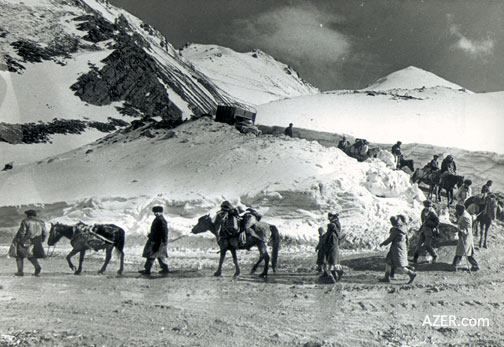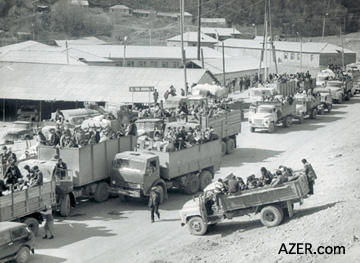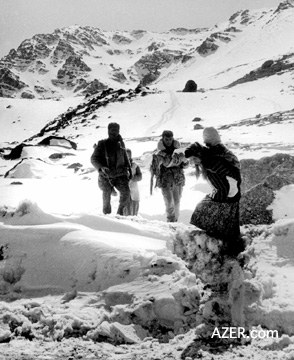|
As we developed articles for
this issue on "Azerbaijan As Seen From Abroad," we
became curious about the types of dissertations that were being
written about Azerbaijan. We soon discovered more than a dozen
works - much more than we had expected - exploring a wide range
of topics, from folklore to political science to education. The
following dissertations are listed in alphabetical order by author's
name. Most were researched and written by non-Azerbaijanis and
completed between 1999 and 2001. These were the ones that we
found that had been written in English. Rashad Abbasov's dissertation
examines the historical, current and prospective relations between
the Caucasus and the European Union (EU), using empirical data
and theoretical analysis. Part of his dissertation will be based
on research that was conducted for his master's thesis at the
London School of Economics and Political Science (2000) entitled
"The Common Foreign and Security Policy of the European
Union: Can Institutional Reforms Overcome National Interests?"
After earning his master's degree in European Studies, Abbasov
joined the Ministry of Foreign Affairs in Baku (January 2001)
to deal with issues related to Azerbaijan's relations with the
EU. His dissertation research constitutes the first attempt to
set a theoretical framework for the relatively anarchic nature
of relations between these two regions. It also represents a
unique opportunity to establish a theoretical framework to promote
understanding of the complexity of current relations between
the two regions. In turn, this may pave the way for drafting
possible scenarios related to how extensive and how intense these
relations may be expected to become in the future. Contact: ra245@cam.ac.uk. Kathleen Ann Collins' dissertation
is a study of political transition in Central Asia from Soviet
republic to post-Soviet state. By analyzing three specific cases
of political transition - Kyrgyzstan, Uzbekistan, and Tajikistan
- she places post-Soviet Central Asia at the center of the classic
comparative politics debate about regime change and democratization.
Her study, which also included research of Azerbaijan, Turkmenistan
and Kazakhstan, is one of the only works of post-Soviet scholarship
to address the complexity of the transition as a whole, and to
analyze the big question of regime change in Central Asia. Kathleen Ann Collins is currently
an Assistant Professor in the Department of Governmental and
International Studies at the University of Notre Dame and a faculty
fellow of the Kellogg Institute for International Studies and
the Kroc Institute for International Peace Studies. She is finishing
a book based on her dissertation, which received the S.M. Lipset
Prize for the Best Comparative Politics Dissertation from the
Society of Comparative Research in 1999-2000. Contact: kcollins@nd.edu. Svante E. Cornell's research
suggests that providing minority populations with autonomy is
gaining appreciation as a method of solving, managing and even
pre-empting ethnic conflict. However, despite the enthusiasm
for ethno-federalism among academics and practitioners alike,
there is reason to argue that the provision of autonomy for a
minority may increase rather than decrease the likelihood of
conflict. In certain political conditions, autonomy positively
influences both the separate identity of the minority, its incentives,
and most of all its capacity to seek separation from the central
state. Cornell's dissertation presents a theoretical framework
that explains the qualities of autonomy solutions that increase
the likelihood of conflict. Svante E. Cornell is currently
Editor of The Central Asia-Caucasus Analyst (cacianalyst.org),
based in Johns Hopkins University, and a lecturer for Uppsala
University's Peace and Conflict Research and East European Studies
Departments. Contact: svante.cornell@pcr.uu.se. Metin Ekichi's dissertation looks at the widely disseminated Turkic epic of Koroghlu (Blind Man's Son), a 17th-century hero who fights with his band of warriors against local rulers. Ekichi's research is based on his fieldwork and examination of more than 100 variants of Koroghlu episodes collected in Turkey. He discusses the complex, often contradictory and controversial character of Koroghlu as hero, examining the aspects of the story that remain the same from version to version. He also covers genre, stylistic and structural features, and the role of storytellers in the recreation, transmission and diffusion of Koroghlu episodes. Metin Ekichi is a faculty member
of Ege University in Bronova-Izmir, Turkey. Contact: mekici@yahoo.com. David Isao Hoffman's dissertation
investigates the state-building trajectories of Azerbaijan and
Kazakhstan against a backdrop of oil-led development. Specifically,
it seeks to document and explain the counterintuitive divergence
in the development of state capacity in these two cases. The
fact that both countries have a wide range of historical and
structural similarities would seem to favor convergence in their
economic and political evolutions. Azerbaijan and Kazakhstan
not only share the political, social and economic legacies of
Soviet rule, but also large hydrocarbon reserves. David Hoffman works for USAID's
Office of Democratic Transition. Contact: dhoffman@usaid.gov.
To order this dissertation, visit: wwwlib.umi.com/dissertations. Emmanuel Karagiannis' dissertation
examines the connection between oil transportation and security
in the Caucasus; the role of Russia, Turkey and Iran in the region;
ethnic conflicts in Nagorno-Karabakh, Turkey, Georgia and the
North Caucasus; inter-state relations; and risk-management strategies
and scenarios for oil companies. Kamer Kasim's dissertation focuses on Turkey's post-Cold War foreign policy toward the Turkic republics of the Caucasus and Central Asia. Due to changes in its external and domestic environment, especially the independence of the Turkic republics of the Caucasus and Central Asia, Turkey has had to change its foreign policy to reflect a new post-Cold War era. Specific chapters cover Turkey's relations with Azerbaijan and the competition for Caspian resources. Kamer Kasim is currently an
Assistant Professor at Abant Izzet Baysal University in Bolu,
Turkey. Contact: kamerkasim@hotmail.com. Laura LeCornu's dissertation focuses on the foreign policy of Azerbaijan, in terms of its strategic location between Russia, Iran and Turkey and its substantial oil and gas reserves. She examines the evolution of Azerbaijan's energy and security policy and identifies the key internal and external factors shaping the country's foreign policy orientation. She provides an analysis of the interaction between the political, commercial and security priorities of an important former Soviet state, and the competing strategic and economic interests of Russia, Turkey, Iran and the United States. Laura LeCornu is currently Caspian
Coordinator for Government & Public Affairs at ExxonMobil
in Houston. Contact: laura.lecornu@exxonmobil.com. Raymond McGhee Jr.'s dissertation examines organizational culture - its mission, practices, rituals, stories, identity and self-belief - in a newly established private university in Azerbaijan. Following an overview of the conditions leading up to the dissolution of the Soviet Union and the parallel pre- and post-independence events in Azerbaijan, McGhee describes the Soviet system of higher education and discusses the reasons for the emergence of private higher education during and after the major reforms of the Perestroika period. He also discusses the impact of private alternatives on higher education in Azerbaijan and the plausible reasons for this sector's explosive growth in the years following independence. Raymond McGhee, Jr. is currently
a research social scientist in education policy at SRI International's
Washington, DC office. Contact: mcghee
@wdc.sri.com. See http://www.ntlf.com/html/lib/umi/1997v.htm. Inna Naroditskaya's dissertation examines the coexistence and interplay of mugham and Western-based composed music. The dichotomy between these two types of music reflects the social, political and cultural complexity of 20th-century Azerbaijan. Her dissertation contains the notation of a traditional improvised mugham performance as well as an analysis of hybrid genres such as mugham operas and symphonic mughams. Describing mugham as a social agent, she covers the entrance of women into the Azerbaijani musical scene in the 20th century and analyzes the genealogy of the musicians who preserved and transformed mugham traditions. Inna Naroditskaya is currently
an Assistant Professor of Music at Northwestern University in
Evanston, Illinois. She is developing her dissertation into a
book for Routledge. Contact: in-narod@northwestern.edu. Fernande Beatrice Scheid Raine
discovered that when looking for a time and place to pin down
when and where the Cold War began, historians have often selected
the Iran Crisis of 1945-1946. Seen from the point of view of
Washington, the Iran Crisis was a good starting point from which
to trace patterns of Soviet expansion and interference in other
countries' domestic affairs. It was not known, however, what
the Crisis looked like from Moscow, or how Soviet policies in
Iran developed during the preceding years. Fernande Beatrice Scheid Raine
currently works as consultant for McKinsey & Company. She
is writing a book based on her dissertation. Contact: Fernande_Raine@McKinsey.com.
To order her dissertation, visit: wwwlib.umi.com/dissertations;
a free 24-page preview is available. (Ms.) Kakoli Ray's dissertation
questions repatriation policy, usually considered the optimal
solution for refugees. Repatriation remains problematic, she
explains, due to issues of economic, social and political integration,
yet the rhetoric and policy of the international refugee regime
remains focused on return. This disjuncture has implications
for planning within the international aid regime, which is responsible
for assisted repatriation and organizing humanitarian assistance.
International planning has yet to develop an adequate systematic
framework, theoretically and practically, to cope with refugee
needs. Kakoli Ray is currently Chief
of Mission for the International Organization for Migration (IOM)
in Bishkek, Kyrgyz Republic. Contact: iomkyr@elcat.kg
or www.iom.int. More at: http://www.princeton.edu/~policyid/papers/kakolir.pdf. Brenda Shaffer's dissertation
examines the mutual connections and influences between the Azerbaijanis
in Iran and in Soviet Azerbaijan and its successor, the Republic
of Azerbaijan. It asks if the Azerbaijanis consider themselves
a collective, despite the political separation under different
regimes. Brenda Shaffer is currently
Project Director at Harvard University's Caspian Program at the
Belfer Center for Science and International Affairs, John F.
Kennedy School of Government. Contact: Brenda_
Shaffer@ksg.harvard.edu; more information: http://
ksgnotes1.harvard.edu/BCSIA/BCSIA.nsf/bios/ShafferBrenda. Back to Index
AI 10.1 (Spring 2002) |



